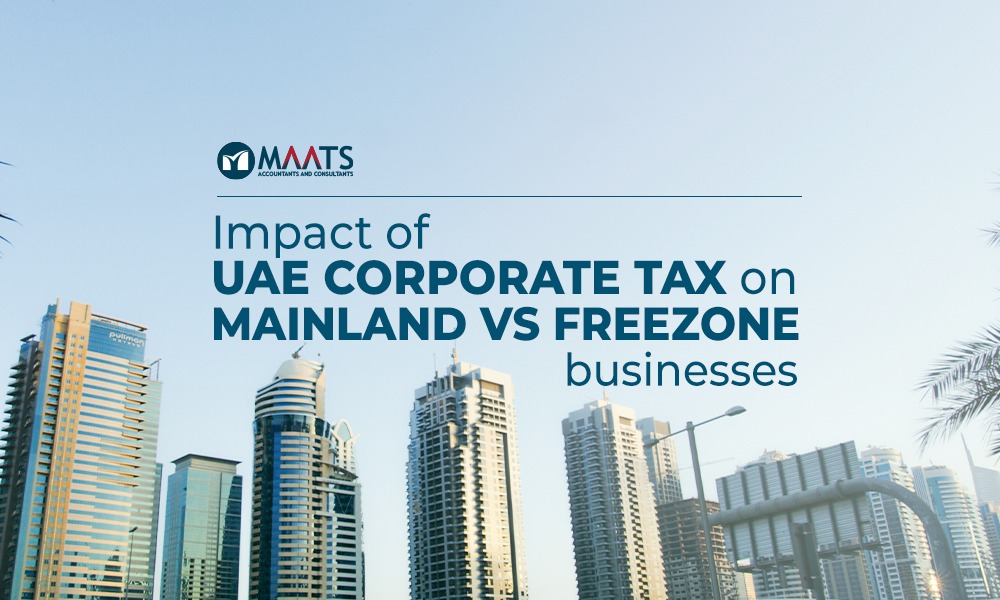The UAE is known to be an extremely favourable place for investors worldwide due to the supporting policies and business environment. The UAE is a leading international financial, commercial space and tourism spot in the Middle East region. The nation has introduced a federal corporate income tax (CIT) which is to be in effect from June 1st, 2023. The introduction of corporate income tax could directly influence Mainland as well as Freezone businesses.
The Corporate tax in UAE
The UAE corporate tax is a direct form of tax levied on the profit of business entities. UAE Corporate Tax will apply to all businesses in the UAE, except for the extraction of natural resources, which will remain subject to Emirate-level corporate taxation. Foreign entities, individuals and businesses will be subject to Corporate Tax only if they conduct a trade or business in the UAE in an ongoing or regular manner.
Mainland vs. Freezone businesses in the UAE
There are the 3 jurisdictions- Mainland, Freezone and Offshore with evident differences with respect to several criteria.
Mainland, Freezone and Offshore businesses have differences in terms of ownership, the scope of business, office space, visa eligibility, company audit and others.
Mainland companies and corporate tax in UAE
A mainland company is nothing but an onshore company that is registered under the administrative authority of the concerned Emirate. A UAE mainland company is mainly characterized by free trading opportunities. The company’s trade license is issued by the Department of Economic Development of the particular Emirate. A registered mainland company in the UAE is authorized to trade in the UAE local market as well as outside the UAE.
Corporate Tax will be charged on the annual taxable income of a Mainland business as follows: For small businesses with taxable profits not exceeding AED 375,000 (approximately USD 102,100) the CIT rate is set at 0% in order to facilitate the development of start-ups, for taxable income exceeding AED 375,000; and a different tax rate (not yet specified) for large multinationals that meet specific criteria sets.
Freezone companies and corporate tax in UAE
In the UAE, there are many Free Zones. A free zone company is formed within a special jurisdiction that comes under the specific Emirate. Free zone jurisdictions have their own guidelines and have a government regulatory body, the Free Zone Authority. A free zone company is characterized by the benefits of 100% foreign ownership and tax concessions. It can only trade within the free zone and outside the UAE.
In the context of Corporate Tax Planning Freezones will be subjected to the new Corporate Income Tax. The tax incentives offered by the Free Zones will be considered by the regime for the businesses there that meet the tax requirements and do not engage in business domestically with the UAE mainland business enterprises or individuals.
The now free zones interest the foreign investors with a zero corporate tax regime. At present, the companies functioning in the free zones are subjected to this zero per cent corporate tax and also zero per cent personal income tax. Free zone companies are permitted to trade within the zone limits and they can also trade internationally as re-exports. These companies will profit from the corporate tax incentives.
Free zone companies are permitted to carry trade in the mainland area as per the agreement with the local distributors. It helps free zone businesses widen their mainland market and build a large customer base for their products and services. Some free zone areas also offer a dual license that allows the companies to extend their activities to the mainland. These free zone companies can carry on business on the mainland from their offices in the free zone. There are also chances that these companies may affect by the new CT law.
Choose the best corporate tax consultancy in the UAE
Investors and entrepreneurs are very much confused about the new corporate tax. As they are eager to know how the UAE corporate tax will affect their businesses, the mainland, as well as the free zone companies, are advised to wait for more clarity from the Ministry of Finance—but consulting an established tax consultancy with the necessary experience in the field as MAATS can help you with adequate information regarding corporate tax advisory. MAATS is a reliable accounting, auditing and VAT and Corporate tax consultancy service provider, that guides the clients with relevant and updated information to keep in compliance with government rules.


